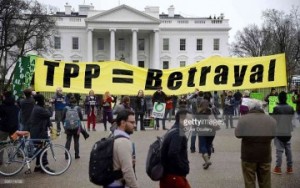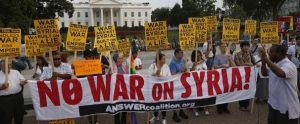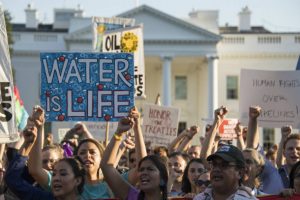Above: Pro-net neutrality rally at the White House shortly before President Obama changed his mind and supported net neutrality which he and his FCC commissioner, Tom Wheeler, had opposed.
Urgent Action Needed to Protect the Right to Protest in Washington, DC

Find the steps to submit a comment at the bottom of this article.
The National Park Service has proposed major changes in rules for protests in Washington, DC that would severely undermine constitutionally-protected First Amendment rights. The National Park Service’s proposed rule changes put forward by the Trump administration and Secretary of Interior Ryan Zinke abride our Freedom of Speech, right to assemble and petition the government for redress of grievances. Below is information on how you can comment on these proposals. You must act by Monday, October 15, 2018.
You can view the comment submitted by Popular Resistance here. Read the affidavit submitted by Kevin Zeese: affidavit-for-the-nps-restrictions-of-the-first-amendment We focused our experience in organizing and participating in protests in Washington, DC, the history and impact of protest on changing the direction of the country, how protest is escalating and needs to be protected as well as on their responsibility to protect Constitutional rights and follow international covenants that the US has ratified. In addition, Popular Resistance joined with a coalition of organizations to submit comments prepared by the Partnership for Civil Justice. To read coalition comment download this file coalition-comment-on-nps-proposed-protest-rules.

The proposed rules would require organizers to pay high fees and costs to hold a protest in Washington, DC. The proposals would ban protests on the White House sidewalk and greatly restrict protests in Lafayette Park across from the White House. Costs could include the expense of erecting barricades, paying the wages and overtime of Park Service officers and the cost of repairing grass. The proposals would also restrict spontaneous First Amendment activities and give the police power to cancel permits for any “infractions”. Long-term encampments like Occupy would be banned, as would long term vigils like the anti-nuclear vigil in Lafayette Park.

These restrictions would undermine hard-won victories for Freedom of Speech and the Right of Assembly in Washington, DC. We need people to take action now to comment on these proposals.
In an administrative proceeding like this, the evidence in the case comes from the record of public comments. Therefore we need you to write comments that reflect on the importance of protest at the White House and in Washington, DC. Popular Resistance will be submitting comments that cover our history of organizing and participating in protests in the nation’s capital, but your individual experiences will also be valuable.

12 ways that the proposals undermine our constitutional rights
The Partnership for Civil Justice, which has litigated many cases involving DC protest, has developed an analysis of the proposed rules. Below are 12 ways that the proposals undermine our constitutional rights.

- Pay to Protest – – Part I. NPS to charge steep costs and fees on any demonstration activity. [?]
- Pay to Protest, part 2 – – NPS to deconstruct free speech activities and charge fees and costs on “special event elements” (i.e., music performances, exhibits) within a demonstration. Removal of the distinct protections and processing of demonstrations in order to treat them in part like corporate sponsored and commercial special events. This is a back-door way to assess prohibitive costs on protests. [?]
- Permits in Limbo and Suppression of Spontaneous Demonstrations – – Removal of the “24 Hour Deemed Granted Rule” that mandates swift action on applications and elimination of any deadline whatsoever for NPS to finally approve a permit application. Spontaneous demonstrations responding to breaking events can be stifled. [?]

Hundreds of immigration rights activists gather on June 1, 2017 in front of the White House to denounce the immigration crackdown by the Trump Administration. (Photo: Stephen Melkisethian/flickr/cc) - Closure of the iconic White House sidewalks to demonstration assemblies (leaving a five foot sliver for a pedestrian walkway) [?]
- Closure of other public spaces on the South side of White House [?]
- New Hair-Trigger to Shut Down Protests – – Allowing police to end a protest for any violation of a permit, no matter how inconsequential, by anyone (even a counter-protester) [?]
- Protecting Grass Over Free Speech – – Codifies the Turf Management Plan with its prohibitively expensive requirements, including forced rental of mega-expensive plastic “Turf Covers” so protester’s feet don’t touch the grass [?]

Climate protesters outside of White House. Photo by Susan Walsh for AP. - Ends Long Term Vigils and Protest Presences – – by setting a maximum period of 30 days, or less, for a protest (the current maximum is four months) [?]
- Expands the strictest restrictions on signs and banner size and material [?]
- Prohibits structures (e.g., stage, fixed sound) within the drop line of trees in Lafayette Park or the Ellipse – – but Lafayette Park is filled with trees [?]
- Prohibits structures (i.e., stage and sound setup or literature tables) without a permit, including in parks for which no permit is needed to have a demonstration [How can protesters use a no-permit-needed park for an assembly without stage or sound to reach the protest?] [?]

Members of Korea Peace Network outside the White House in June. (Facebook/KPN) - NPS also seeks comment on whether to decrease or increase the number of people, and parks, in which protest is allowed without any permit at all (i.e., Franklin Square, McPherson Park, potentially Dupont Circle, and more). Apparently, NPS thinks even fewer no-permit-needed spaces are a possibility. [?]
Creating an effective comment on these proposals
- Explain how the right to protest is important to you.

Chelsea Manning freedom protest outside of White House, urging President Obama to pardon Chelsea Manning. From Chelsea Manning Support Network. - Tell the NPS how these changes will hurt you, and the organizations you work with as well as the issues that matter to you.
- If you have specific examples of protests you have helped to organize or participated in, explain how these changes would have impacted you.
- Review the 12 ways the new rules will undermine Freedom of Speech and describe situations where they would have affected your action or could affect your action in the future.

CODE PINK sign at Korean war protest at White House April 26, 2017. Photo by Chris Owens - Try to comment on as many of the 12 issues as possible. Explain why you object to each.
- You can discuss protests that have occurred in Washington, DC during the nation’s history.
- If you have photos or videos relevant to the issues under consideration you can include those.
How To Submit Your Comments
You have until October 15, 2018 to make comments on the National Park Service’s proposed rule changes.
Your comments have to be submitted through the Federal Register.
We are not able to provide an automatic tool.
Please click here to submit comments to add your comment to the Federal Register website to protest these proposed rules.

